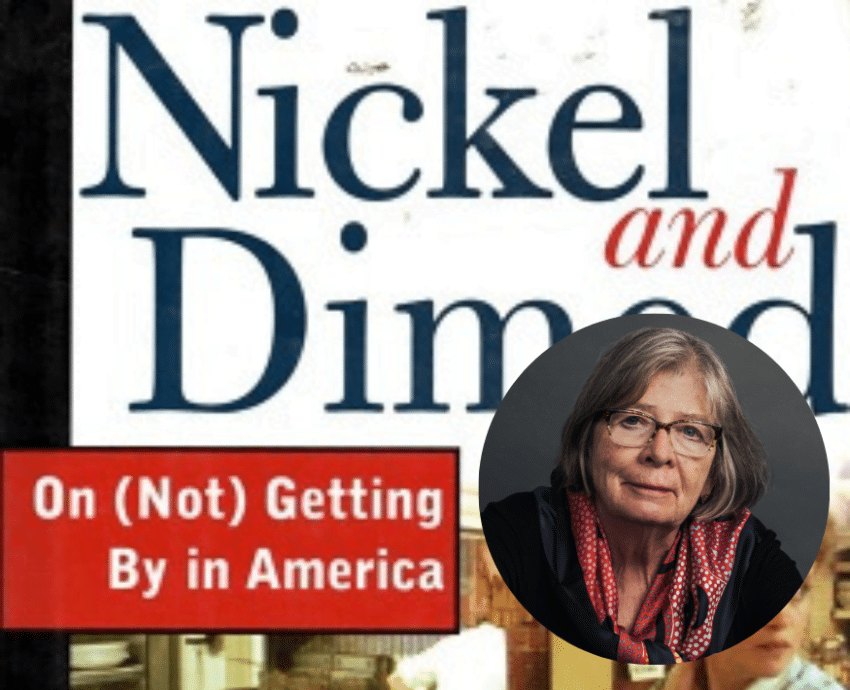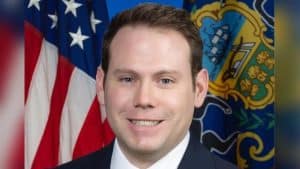On Sept. 1, 2022, progressive writer Barbara Ehrenreich died. Ehrenreich, a member of the Democratic Socialists of America, was a voice for the economically vulnerable, sharing her detailed research about the individual’s experience in the American economy. In celebration of her and her body of work, I am reviewing this book about if and how low-wage jobs cover everyday living expenses.
In the late 1990s, after welfare reform legislation passed requiring recipients to get back into the workforce, Ehrenreich embarked on a journalistic project to find out if “unskilled” worker compensation (that’s not union protected) was able to cover the necessary expenses of food, housing, utilities, transportation, and childcare. This intrepid writer over a period of about 3 months worked 6 jobs in 3 different states (Florida, Maine, and Minnesota). These jobs were all in the service sector: restaurant service and elder care, domestic housekeeping, and retail sales. All of this was research for her essays on the working poor and her book Nickel and Dimed: On (Not) Getting By in America, first published in 2001.
The experiment was for the author to see if she could meet her expenses while working low paying jobs. The result? It’s an interesting confluence of pressures which make life more stressful and more expensive for the working poor. Sometimes some can meet their expenses and sometimes they can’t. Ehrenreich was able to sustain her expenses in each locale in most jobs. However, she did not have to juggle the expense of childcare plus the unpredictability of disruptions for a child or caregiver’s illness. She never had to miss work because of those unforeseen yet ubiquitously predictable inconveniences. Nor did she have an aging or chronically ill family member to care for herself. Furthermore, she began her experiment with her own reliable car, so depending upon the whims of public transportation was never a factor.
Back in the 1990s as is true today, housing expenses were the biggest hurdle to low wage workers being able to meet their budget. Rent was, and is, unethically high and out of reach for many Americans economically. The assumption at the time of welfare reform, that work was the only way out of poverty for most Americans, is disproven as myth. Unfortunately, for most people in the middle and upper classes, the working poor are so invisible that anyone living below the poverty line is seen as defective rather than a victim of debtor wages with a lack of meaningful social safety nets. What has made these folks invisible? First, welfare reform had no intention of following up on people who went from welfare to work to see if their conditions improved. Second, there has been a reduction of public spaces that have been shared by all members of diverse economic classes. Much of well-kept “public” spaces have been sequestered in private gated communities affordable only to the professional managerial class. Over the decades the wealthier among us have chosen private education for their kids, so there is less economic diversity in the public schools. These poor became invisible to us all perhaps because we wanted them to be. We didn’t want to see poverty as a cause from a broken system rather than a moral failing of the individual. As Ehrenreich put it, our societal response would have to shift from blaming and judging the poor to feeling shame that we have somehow failed them in the wealthiest country on the planet. I wonder somehow if the so-called War on Terror after 9/11 gave our federal government the excuse to focus attention elsewhere for at least the next decade.
The author talks about the time she must put in to budget her meager pay, to find housing, and the exhausting drain of work that is unpredictable, demeaning in how those who do it are treated by management, customers, and our society generally. She also with humor and without judgment shares interactions she’s had with co-workers and bosses and has talked about their challenges and their stories. She does this with kind irony and confesses mistakes she herself has made as a co-worker to a fellow pregnant domestic services worker who was not eating enough to do her work in a safe, healthy manner. Ehrenreich dispels the notion that there is any such thing as unskilled labor at all. She herself claims there was a learning curve for every job she had taken. She argued that so-called “unskilled” were amongst the least lazy of us, such as the waitresse who wanted to best serve customers even though the owners wanted to skimp on “extras” like an extra roll in the basket for instance. In Maine, house cleaners working for a franchised service didn’t like the time constraints put on them preventing them from doing a more thorough job. Ehrenreich describes a cringeworthy way they are trained to approach housecleaning to maximize the appearance of clean rather than actual cleaning. All of this is to save time and add more houses to clean each day. Virtually all workers with kids had to juggle sudden changes in scheduling – disrupting their childcare routines. Lack of paid time off for emergencies was another stressor. Some of these emergencies also put the workers’ continued employment at risk.
As Ehrenreich looks through the clothing at one of the big box stores where she worked in Minneapolis, she notes all the places where these are manufactured using cheap labor in Asia or South America. She talks about the hoops she must jump through to get a state-funded housing voucher so she can move from a motel to an efficiency apartment. She talks about how virtually all the employers on her route from work to home to the housing agency are all national chains, not locally owned businesses. So, there are no ties or commitment to the communities where all these stores and shops are located. Ordinary wage workers to the corporate headquarters “suits” are not human beings but human resources. Invisible.
I would argue that some of the lowest paid workers in so-called “unskilled” jobs provide the highest value for society in their work. I’ll give an example for myself with how I’ve personally benefited from these folks. In the last 6 weeks I’ve had 2 surgeries requiring overnight stays at an orthopedic surgery center. I got excellent care from the highly skilled team that was there for my well being. I will never discount that. But I really appreciate the cafeteria worker who got me fed and the custodial staff who kept my room clean. Those folks who work hard and contribute in that way toward patient healing must be treated with dignity and respect because their jobs are life saving for the patient, too. But so often, they are overlooked. If they did strike, however, patient care would be in jeopardy.
Ehrenreich learned how important it was for each worker to do their job well enough to not get negative attention from management and yet not so well that it jeopardized other workers. She came to realize that no “extras” would get her any appreciation or an increase in pay. But it might be a threat to the other workers. Her fellow waitresses in Florida were unhappy about her sprucing up the look of the desserts in the dessert case during slow periods at the diner. They were afraid it would make them look bad and add that task to an expected burden of duties. Even in non-union jobs the ethic of solidarity is alive. Critical mass however is needed for workers to demand change and the exhaustion of surviving this kind of life in and of itself becomes a hurdle against this. The author also describes the demeaning process some employers impose in the hiring process – namely drug and personality tests prior to job offers. Could those personality tests weed out so-called “trouble-makers” and “organizers”? Perhaps.
One statistic in the 1990s Ehrenreich offers is that according to a survey conducted by the US Conference of Mayors, 67 percent of adults requesting emergency food aid are people with jobs. “No one ever said you could work hard and still find yourself sinking deeper into poverty and debt … The working poor are in fact the major philanthropists of our society. They neglect their own children so the children of others will be well cared for … They endure privation so that inflation will be low and stock prices will be high. To be a member of the working poor is to be an anonymous donor … a nameless benefactor to everyone else.” I have no statistics on how many employed people are unhoused. But they are there.
One of Ehrenreich’s co-workers expressed it this way – “you just give and give” – with no expectation of decent compensation or appreciation. In the last chapter, during her debrief of her experiment, she wonders if this acceptance of struggle will continue to be tolerated forever or if workers in the bottom 20 percent of wage earners will one day collectively say they’ve had enough of carrying the burden of poverty for the convenience of the rest of society. As disruptive a rebellion against this system might be, I for one feel it would ultimately benefit everyone in the long run.
Thank you posthumously, Barbara Ehrenreich, for being a voice for the voiceless and setting a stage for the invisible to be seen. Rest in power.







